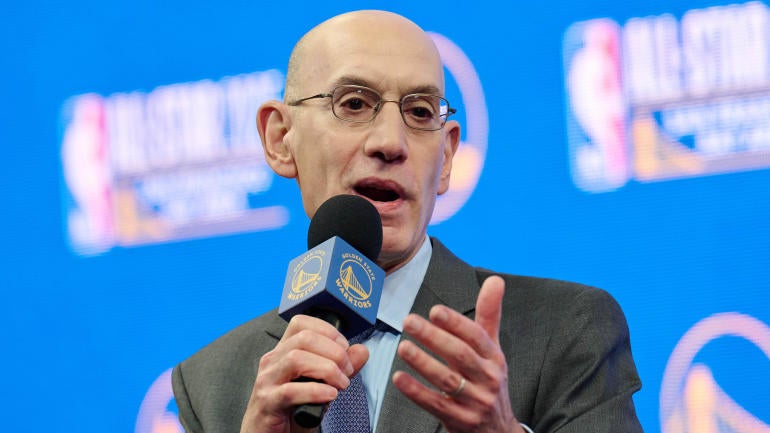
NBA commissioner Adam Silver not only confirmed that the league might make its draft a two-night affair, he said that he would like this to happen as soon as possible. In an interview with SiriusXM NBA, Silver said that he'd like the change to take effect as soon as possible.
"I'm hoping to get there actually for this season, for this June, and move the second round to its own night," he said.
Silver said there's work to be done with ESPN/ABC and the National Basketball Players Association "to make sure it makes sense for everybody, but, to me, it essentially seems like a no-brainer." He referenced former second-round picks Nikola Jokic -- who was famously drafted as viewers watched a Taco Bell commercial -- and Draymond Green while arguing that "it seems unfair to the second-round players that we're still on the air at 12:30 or whatever in the morning Eastern Time."
In Silver's estimation, the "large, global pool" of potential draftees warrants a bigger spotlight than the current format allows: "The talent goes so deep now, and the interest is so great, to me, both rounds deserve prime time, in essence. So what we'd like to see is making it two nights. And I think we'll get there."
An oft-cited benefit to adding a second night is that it will give everybody involved a bit more time to do their jobs. Part of the appeal of the draft is that front offices are on the clock, under pressure, but, particularly in the second round, when picks are separated by only two minutes (as opposed to five in the first round), it can feel frenzied. With a day in between rounds to recalibrate -- and make trades -- the draft would be covered and executed differently.
To Silver, this would be a good thing. Television announcers would have "a little bit more time between picks to talk about who they are and why they make sense for those teams, Silver said, and "maybe even more importantly, it gives our general managers the opportunity to reset after the first round, say, 'All right, this is where we stand, we got this player we were hoping to get, we didn't get that player, let's reassess what our needs are.'"
“I’m hoping to get there for this June…and move the 2nd round [of the Draft] to its own night”
— SiriusXM NBA Radio (@SiriusXMNBA) December 6, 2023
NBA Commissioner Adam Silver confirms the league would like to make the Draft a two-night event.@siriusxm | @siriusxmsports | @NBA | @TermineRadio | @JumpShot8 pic.twitter.com/6Xr6C2eJUJ
On the subject of point differential being used as a tiebreaker during the In-Season Tournament, Silver sounded much less enthused about a potential change. He's well aware that some players are not into it, but repeatedly said that, while this is new for the NBA, it's standard elsewhere.
"I've already heard from some players and some coaches who say, 'I never got it, we should all keep playing. Where'd that tradition [of not 'running up the score'] come from?'" Silver said. "But putting that aside ... this notion of group play then knockout round, that's something we took from international competition. Just like this whole idea of having an in-season cup is something that we stole from international soccer. And even in international basketball, in FIBA competitions, they use those point differentials that determine tiebreakers. So it wasn't a new concept."
Silver hedged, though, by saying that he pays attention to feedback. If there's enough of a push for an alternative -- and the proposed alternative makes sense -- then perhaps point differential won't come into play next time.
"I don't want people to think this is about poor sportsmanship or anything else when teams are trying to increase the margin, the score margin," Silver said. "So, one thing we said when we went into this: Let's get through the tournament, and then we'll sit down, we'll go over everything, we'll get back comments back from players, teams, media, etc., and think about if there are changes we should make.
"Certainly that's one we'll look at, but then we'd need another way to break tiebreakers. And again, just as we see in international competition, it may be part of the issue was a transition and understanding ... what these new rules are. Because again, it's not just international soccer. In international basketball tournaments, again, this is a concept that's been used for a long time, and everyone's accepted those point differentials matter. So I just think maybe it's a question of ensuring that everybody has the right understanding going in, but also we'll look at that if people don't think it's the right thing."
Silver and Evan Wasch, the NBA's head of basketball strategy and analytics, have both been consistent in their messaging about the tournament over the past several months: This is just Year 1, and the league expects it to evolve over time; if there are problems, they can be fixed. It is not clear, however, that players like Jayson Tatum being uncomfortable with continuing to play until the final buzzer actually constitutes a problem -- or at least that it's a problem for the tournament. The message to those players from the likes of Devin Booker and Steve Kerr (and the league, if the format remains the same) is: That's your problem.


















